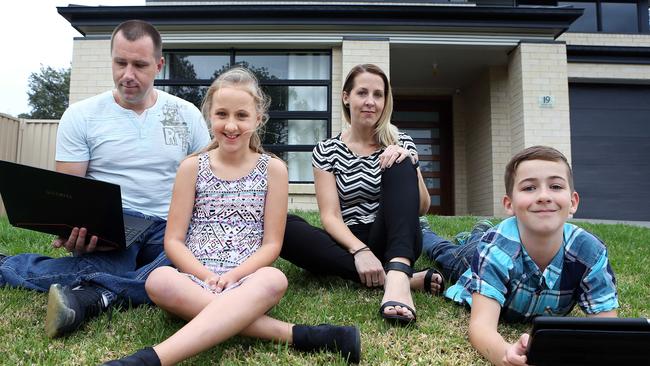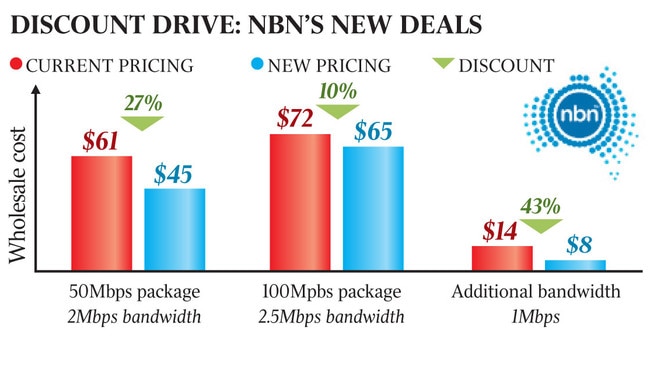Troubled NBN drops prices to win over consumers
The National Broadband Network will cut its wholesale prices to encourage internet users to upgrade to faster connections.

The National Broadband Network will cut its wholesale prices to encourage internet users to upgrade to faster connections, in a desperate bid to restore confidence in the troubled project.
In the biggest concession yet that its model of selling expensive “bandwidth” is flawed, NBN Co said it would offer telcos new top-speed NBN packages at discounts of up to 27 per cent.
The moves mark an attempt to unclog the bottlenecks caused by Telstra, Optus, TPG and others who are not buying enough bandwidth to prevent internet speeds from plunging at peak times, such as after 5pm on weekdays.
NBN Co hopes the telco discount offers, which it denies will hurt its bottom line, will be passed on to customers who will in turn pay for faster NBN packages.
More than 80 per cent of people are currently opting to buy the NBN’s two lowest-speed packages, meaning they are achieving speeds as low as, or in some cases even lower than, what was available before the NBN was built.
NBN Co chief executive Bill Morrow said yesterday’s moves were designed to “unleash the power of the NBN”, with just 16 per cent of users buying the two top NBN speed packages when those speeds were available to the “vast majority” of users.
“Australians are funding this world-leading infrastructure and the majority of them, as end users, are purchasing plans that give them no better — and in some cases lower — speeds than they can get from their legacy network,” Mr Morrow said yesterday.

During peak times, internet speeds have slumped as people use the internet to stream video services such as Netflix and Stan on different devices at the same time.
NBN Co currently sells to telcos four NBN connection plans which are then sold to consumers: 12 megabits per second, 25Mbps, 50Mbps and 100Mbps.
In addition, telcos are required to buy enough bandwidth — or CVC — which ensures the internet “pipe” is wide enough to allow those speeds to be achieved by homes at peak times. In a bid to recover the cost of the $49 billion network, NBN Co placed a very high price on CVC comparative to other broadband network providers internationally.
Amid a “land grab” to sign up as many new users as possible, telcos have failed to buy enough bandwidth, causing massive congestion at peak times. Yesterday’s announcement aims to sidestep the bandwidth problem by bundling CVC with 50Mbps and 100Mbps packages, effectively forcing telcos to buy enough — provided they offer the packages to consumers and they buy them.
NBN Co said the new 50Mbps package would come with double the average bandwidth purchased by telcos and would wholesale for $45 a connection, 27 per cent less than the $61 it would currently cost telcos to buy a 50Mbps connection with the same CVC. The new 100Mbps package would come with 2½ times the current average CVC and would cost $65, compared with $72 currently, a 10 per cent discount.
Industry experts said the 50Mbps package would likely sell to consumers for about $70 to $80 a month.
The new packages would be made available between April and June next year.
NBN Co said that, in the interim, from today, telcos could access a promotion giving them, for free, 50 per cent more CVC than they already paid for. Also telcos would be able to buy the existing 50Mbps package, which NBN wholesales for $34 a month, for the price of the 25Mbps package, between $27 and $30 a month.
Because the NBN will be built regardless, it doesn’t cost the NBN any more to provide free or faster services. However, doing so could see it lose revenue. Mr Morrow said NBN Co was on track to meet its 2020 completion target and its “peak drawdown” of funding of $49bn, and the changes would not hurt its bottom line.
Telco industry veteran Damien Ivereigh, chief executive of Launtel, said the moves could underpin NBN Co’s revenues because people would be offered a new quality product with a point of difference: guaranteed minimum bandwidth. “Where the program is suffering is the telcos are getting away with selling very poor products based purely on price,” he said.
“This will now allow the telcos to say ‘this is the new-beaut product you have heard about’ and many people will be willing to pay more than the 50-odd dollars a month they were paying for the connection which didn’t work.”
He said there was “so much negative press” surrounding the NBN that people were willing to pay for a product that could guarantee higher minimum speeds.
NBN users who have previously discussed problems with the network with The Australian would welcome any improvements but they were not holding their breath.
Benjamin Stewart, from the NSW central coast, said the NBN had been a “frustrating mess” and he had experienced more internet outages “in the last six months that I had in the last six years”.
“Cheaper is always better but will (telcos) pass on the savings? Who knows?” he said.
Jim Kelly, who operates Brisbane Cruises, said his small business continued to have intermittent problems with its NBN connection and, as a result, its phone system. “Any improvement would be good but we’ll wait and see,” he said.



